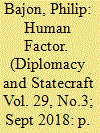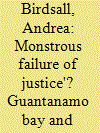| Srl | Item |
| 1 |
ID:
161042


|
|
|
|
|
| Summary/Abstract |
This analysis reviews a crucial moment in the contemporary political and constitutional history of Western Europe. Prior to the “empty chair crisis” in 1965–1966, an important Franco–West German summit had failed and allowed the French president, Charles De Gaulle, to jeopardise negotiations in the European Economic Community. This analysis not only illustrates the overwhelming importance of Franco–West German bilateralism in the prelude to the crisis, but also analyses the negotiating behaviours of De Gaulle and West German Chancellor Ludwig Erhard at the summit of 11–12 June 1965. Contrary to conventional wisdom, Erhard, rather than the allegedly anti-European De Gaulle, doomed the negotiations. Furthermore, this study draws pragmatically on social institutionalism and constructivism to shed light on Erhard’s mental map and identify the relevant considerations in his decision-making and bargaining. Rational choice approaches fail to explain the “human factor” in Erhard’s negotiating behaviour and the mysterious breakdown of Franco–West German entente in summer 1965.
|
|
|
|
|
|
|
|
|
|
|
|
|
|
|
|
| 2 |
ID:
099894


|
|
|
|
|
| Publication |
2010.
|
| Summary/Abstract |
This article considers challenges to the existing international human rights regime in the post-9/11 era. It uses an interdisciplinary approach that brings together issues of politics and law by focussing on international legal provisions and setting them into the context of International Relations theory. The article examines the establishment of Guantanamo Bay as a detention centre for suspected terrorists captured in the 'war on terror' and focuses on violations of international human rights and humanitarian law in the name of national security. This article demonstrates that the wrangling over Guantanamo Bay is an important illustration of the complex interaction between interests and norms as well as law and politics in US policy making. The starting point is that politics and law are linked and cannot be seen in isolation from each other; the question that then arises is what kind of politics law can maintain.
|
|
|
|
|
|
|
|
|
|
|
|
|
|
|
|
| 3 |
ID:
142622


|
|
|
|
|
| Summary/Abstract |
The article looks at Uzbekistan's political economy from the perspective of a logic of appropriateness, an approach that takes rules to be the underlying principle of action. The rules are mostly in line with a ‘spirit’ of self-reliance (mustaqillik), which has shaped Tashkent's international engagement since independence. From the perspective of those rules, the article reveals some important features of Russian–Uzbek relations, particularly the difficult and often tense negotiations over the future of the Tashkent Aviation Production Association (TAPOich). Self-reliance and the rules by which it was comprised were not, in the end, conducive to long-term cooperation with Russia in the aviation sector, where collaboration was first and foremost necessary.
|
|
|
|
|
|
|
|
|
|
|
|
|
|
|
|